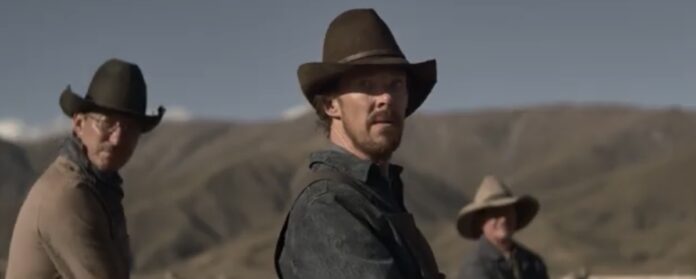New Zealander Jane Campion (1954), already winner of three Oscars in 1994 with “Piano Lessons”, returns to the screens as a director and screenwriter after twelve years since Bright Star (2009).
Jane Campion’s latest work, “The Power of the Dog”
While tackling current issues, through metaphors and symbolic juxtapositions, Campion does a very big favor to the international community, but at the same time she risks to make the audience be confused. Her latest work, “The Power of the Dog”, winner of the special prize for directing at the last Venice Biennale, she tackles highly topical issues. But, in an oblique way, she transmutes them offering them as if they started from afar. In her western genre film (anyway we can only appreciate environments and desolation), two brothers – who could not be more different – live as being two separate universes. That’s due to the not only to the psychological and behavioral description, but also to the odd choice of the cast.
Men from the far west
For example, the dirty and evil Phil, Burbank played by Benedict Cumberbatch, and the sensitive George, Burbank played by Jesse Plemons. Cumberbatch, who was the modern Sherlock Holmes, a brain up with intelligent ice eyes, here is an ambiguous herdsman who hates for no reason and never washes, according to the rules of the West.
Perhaps because of the misleading fact that he played the role of the most famous investigator known in history as well as the role of the persecuted scientist Alan Turing (one of the pioneers of computer science), in “The Imitation Game” film (2014). And all this does not make the good actor entirely believable. But, even by getting rid of our mental superstructures, we can only appreciate Cumberbatch’s ability to immerse himself in the roughness of the times, and to abandon the self-confidence of an uncompromising Englishman and coldly emasculate a calf. A perfect dusty and smelly man who is very suitable to a ranch atmospheres. But that’s not enough.
The disturbing element
Rose, the widow that her brother starts dating, a lukewarm Kristen Dunst, adds elements of imbalance in the well-established management of the cowboys’ daily life. But it’s Peter, played by Kodi Smit-McPhee, who upsets the balance. He is Rose’s son, a young college-age aspiring too become a surgeon. His transparent eyes make him look him closer to his evil and oppositional brother. Anyway, it seems that these common features can cause their rapprochement.
Ambiguity and slowness, Jane Campion and the lesson to be learned
Slowly and not without ambiguity, Jane Campion makes the dusty images telling us about diversity, domination, hierarchies and anaffectivity, sense of justice be supported by a wonderful original soundtrack composed by Jonny Greenwood who for the first time collaborates with the New Zealand conductor.
But not everything is as it appears and we can not understand why the title of the film is revealed to us towards the middle of the film, but only at the last scene: It only occurs after two hours of viewing which anyway it does not always thrill and overwhelm us. But perhaps this was precisely Jane Campion’s aim: reality must be gutted and discovered after much observation. We got the lesson.
La neozelandese Jane Campion (1954), già vincitrice di tre premi Oscar nel 1994 con “Lezioni di piano”, torna sugli schermi in veste di regista e sceneggiatrice dopo dodici anni da Bright Star (2009).
L’ultimo lavoro di Jane Campion, “Il potere del Cane”
Quando la Campion affronta temi attuali, con metafore e accostamenti simbolici, rende un grande servizio alla comunità internazionale; ma rischia di scivolare confondendo lo spettatore dall’obiettivo. Il suo ultimo lavoro, “Il potere del Cane”, premio speciale per la regia all’ultima Biennale di Venezia, tratta temi di forte attualità. Ma lei, con modalità oblique, li trasmuta e li offre come se partissero da lontano. Nel suo western (che del genere western ha solo ambienti e desolazione), due fratelli – che più diversi non potrebbero essere – vivono come due universi separati, non solo per descrizione psicologica e attitudinale, ma anche per curiosa scelta del cast.
Protagonisti, uomini del far west
Lo sporco e cattivo Phil Burbank, interpretato da Benedict Cumberbatch, e il sensibile George Burbank, ruolo sostenuto da Jesse Plemons. Cumberbatch, che è stato lo Sherlock Holmes moderno, con intelligenti occhi di ghiaccio e cervello fino, qui è un ambiguo mandriano che odia senza motivo e non si lava mai, secondo le regole del west.
Forse depista il fatto che ha interpretato il ruolo del più famoso investigatore deduttivo che la storia conosca e quello del perseguitato scienziato Alan Turing (tra i pionieri dell’informatica), in The Imitation Game (2014). E tutto questo non rende del tutto credibile il bravo attore. Ma liberandoci delle sovrastrutture mentali, quanto meno riusciamo ad apprezzare la capacità di Cumberbatch di calarsi nella rudezza dei tempi, di abbandonare la sicumera da intransigente inglese ed evirare a freddo un vitello. Il perfetto uomo impolverato e maleodorante che un ranch si merita. Ma non basta.
L’elemento di disturbo
Rose, la vedova che il fratello George inizia a frequentare, una tiepida Kristen Dunst, inserisce elementi di squilibrio nella rodata gestione della quotidianità dei cow-boy. Ma ciò che scompone gli equilibri è Peter, (interpretato da Kodi Smit-McPhee), figlio di Rose, giovane in età da college e aspirante chirurgo. Saranno gli occhi trasparenti ad avvicinarlo, almeno esteticamente, al fratello malvagio e oppositivo, ma saranno alcune similitudini fra i due a provocare relazioni non ostili.
Ambiguità e lentezza, Jane Campion e la lezione da apprendere
Lentamente e non senza ambiguità, Jane Campion accompagna le polverose immagini che parlano di diversità, dominazione, gerarchie e anaffettività, desiderio di giustizia de Il potere del cane con una meravigliosa colonna sonora originale dell’inglese Jonny Greenwood, alla sua prima collaborazione con la Campion.
Ma non tutto è come sembra e la ragione del titolo non ci viene svelato verso la metà del film, come siamo innocentemente portati a pensare, ma solo all’ultima scena. Dopo poco meno di due ore di visione che non sempre appassiona e travolge. Ma forse era proprio questa l’intenzione di Jane Campion: la realtà deve essere sviscerata e scoperta dopo molta osservazione. Abbiamo capito la lezione.
Leggi anche:








